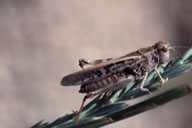Grasshopper control in gardens and small acreage
Difficulty of Grasshopper Control
With disproportionately long (and strong!) back legs and wings, grasshoppers are one of the most mobile insects in nature. It’s this mobility that makes each of Colorado’s 100 species of grasshoppers very difficult to control. If grasshoppers were humans, they could launch themselves the length of a football field when they jump. When they fly, they can reach speeds of eight miles  per hour.
per hour.
A grasshopper by any other name is a locust, so it should come as no surprise that in the United States alone, grasshoppers/locust cause $1.5 billion of damage to grazing lands and forage crop acreage per year. They also enjoy dining on garden and landscape plants and vegetable crops.
Grasshopper Control
Natural control of grasshoppers is possible if Mother Nature is on your side. Colder annual temperatures can accomplish quite a bit, starting with killing a majority of eggs laid in the dirt in the late summer and early fall. The eggs of most grasshopper species overwinter and the hatchlings, called nymphs, emerge in the spring. A cold winter and cold, wet spring could substantially reduce the grasshopper population. A dry late spring and summer reduces grasshoppers’ food source, which leads to fewer eggs being laid and hatched in the following season.
Certain species of flies are predators and parasites of grasshoppers. Birds and even coyotes feed on grasshoppers. Wet weather can lead to the development of a fungus or an internal nematode that kills grasshoppers.
Sprays and baits are used for outbreaks. Because grasshoppers are so mobile, it’s easy to spray too small of an area or spread bait in to large of an area. Professional application of sprays and placement of baits ensures that the correct chemical is applied accurately at the appropriate lifecycle stage and careful placement of baits so that humans, livestock, pets, wildlife and beneficial insects aren’t at risk.
If you’d like to control the grasshopper population on your property, contact SprayTech at 720-248-0000 to discuss treatment options.


Comments are closed.